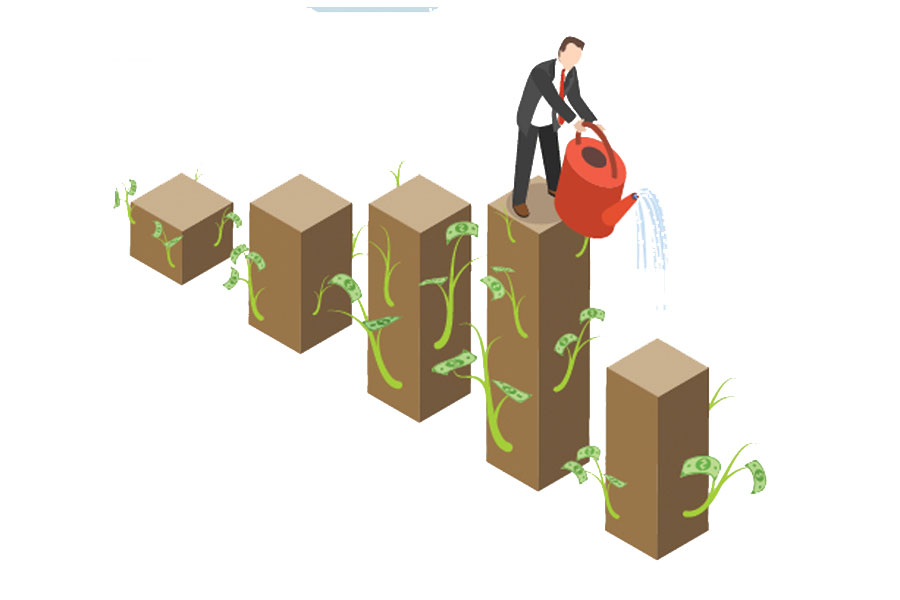
Films Review | Mar 02,2019
Nov 21 , 2020
By Carolyn Kissane
Sometimes, it is possible to wonder what a life free of worries would be like – aday where we go about our business, enjoy each moment, tackle whatever comes our way with determination and confidence, without the slightest of self-doubts. It seems that is the life.
Worrying is the brain's way of preparing us for the worst-case scenario or maybe even giving us a precautionary heads up for what could possibly go wrong. Life as we know it would have been completely different if worrying was out of the equation. This is even true of overworrying, because most of us over think, analyse and worry. Mostly we worry about our existence and incidents that can pose a threat to our existence. Even though we all know our life on this earth is temporary and limited, we somehow think we can add a couple of years by obsessing about what could be, could have been, and perhaps what will never be.
I envy people who can just let go and have faith in the universe or even higher power. On the other hand are some of us who cannot help but worry too much. I have caught myself worrying about my worrying and overthinking my over thinking on multiple occasions. The paradox about worrying, nonetheless, is that the more we try not to worry, the more we do worry.
Something that goes hand in hand with this is assuming the worst. I often obsess about the possibility of getting into a vehicular accident, especially if I am sitting in the front seat of a car –- not without reason, of course, considering that Ethiopia has one of the highest traffic accident rates in the world. I almost go crazy worrying that something terrible would happen to my son if I leave him home with just the nanny. Every time a family member leaves the house and stays unreasonably late, without informing me, I start to think that they may have gotten themselves hurt, perhaps fatally.
All of these are normal, but what makes them different is their degree and intensity. But like many people, my worrying stems from my fear of death. Everyone has this obviously, but some of us have it worse than others, sometimes to a crippling degree. In particular, it is the fear of losing the people I love; not getting the chance to say my goodbyes properly; living the rest of my life with what I could have done differently.
"What is wrong with you. How could you possibly think that?" the rest say to people like us.
We cannot help it. It is not lost on us that this kind of thinking could lead to anxiety and depression. People who think something terrible will happen to them every time they leave the house, for instance, could avoid going out and outdoor activities, thereby limiting their exposure. In the long run, this could lead to depression. Worse still, by worrying about unrealistic things, we are telling our brain to release cortisol, a stress hormone that may cause long-term health complications.
Why are we like this?
It is controversial, but most likely it has to do with some evolutionary need for survival and reproduction –- almost everything does according to contemporary biology. There is a somewhat more romantic psychological reason for worrying though. When we hold someone dearly, we get overly attached. We point to that love as a reason for our happiness, and the very thought of departing from that object of love terrifies us to the core. The slightest possibility that that could take away our happiness becomes an imminent danger to our being. Indeed, attaching our happiness to people or objects is the main source of disappointment. But at the same time, having no attachment makes life dull. It is another dilemma.
It is not a completely hopeless thing. We can alleviate some of our worrying by taking the time to pay attention to our thoughts and reasoning out with ourselves. Practising mindfulness in this regard seems to help; being in the present and focusing on the here and now keeps our mind from wandering off.
We should also face our fears. This makes us often realise that our fears are blown out of proportion, and it is actually our brains playing tricks on us. If these thoughts get out of hand, it is perhaps best to get professional help. But it is never wise to give up.
PUBLISHED ON
Nov 21,2020 [ VOL
21 , NO
1073]


Films Review | Mar 02,2019

Radar | Dec 19,2020

Films Review | Dec 07,2019

Life Matters | Nov 16,2024

Sunday with Eden | Feb 13,2021

Sunday with Eden | Apr 13,2019

Fortune News | Sep 26,2021

Commentaries | Sep 14,2019

View From Arada | Jul 23,2022

Commentaries | Jun 01,2024

My Opinion | 131548 Views | Aug 14,2021

My Opinion | 127903 Views | Aug 21,2021

My Opinion | 125879 Views | Sep 10,2021

My Opinion | 123510 Views | Aug 07,2021

Dec 22 , 2024 . By TIZITA SHEWAFERAW
Charged with transforming colossal state-owned enterprises into modern and competitiv...

Aug 18 , 2024 . By AKSAH ITALO
Although predictable Yonas Zerihun's job in the ride-hailing service is not immune to...

Jul 28 , 2024 . By TIZITA SHEWAFERAW
Unhabitual, perhaps too many, Samuel Gebreyohannes, 38, used to occasionally enjoy a couple of beers at breakfast. However, he recently swit...

Jul 13 , 2024 . By AKSAH ITALO
Investors who rely on tractors, trucks, and field vehicles for commuting, transporting commodities, and f...

Jun 28 , 2025
Meseret Damtie, the assertive auditor general, has never been shy about naming names...

Jun 21 , 2025
A well-worn adage says, “Budget is not destiny, but it is direction.” Examining t...

Jun 14 , 2025
Yet again, the Horn of Africa is bracing for trouble. A region already frayed by wars...

Jun 7 , 2025
Few promises shine brighter in Addis Abeba than the pledge of a roof for every family...

Jun 29 , 2025
Addis Abeba's first rains have coincided with a sweeping rise in private school tuition, prompting the city's education...

Jun 29 , 2025 . By BEZAWIT HULUAGER
Central Bank Governor Mamo Mihretu claimed a bold reconfiguration of monetary policy...

Jun 29 , 2025 . By BEZAWIT HULUAGER
The federal government is betting on a sweeping overhaul of the driver licensing regi...

Jun 29 , 2025 . By NAHOM AYELE
Gadaa Bank has listed 1.2 million shares on the Ethiopian Securities Exchange (ESX),...